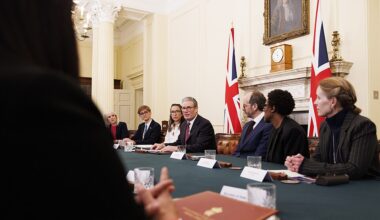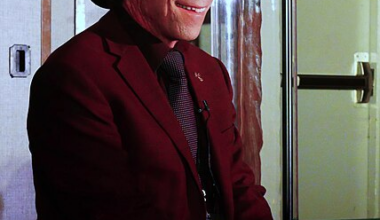In my capacity as a science educator and speaker, I once sat across a table in front of A-level physics students at a top 50 all-girls grammar school with great interest as to what their future plans were. To my shock, the first girl informed me of her dreams of being a TikTok influencer. I asked if this was science-related, but unfortunately, it was not. This instigated an excited discussion among the others at the table, several of whom had no dreams of STEM, but plenty of social media fame.
I put the incident behind me, but only four days later at an all-boys grammar school, the same thing happened—except social media stardom was replaced with professional gaming and esports. In the space of five days, I had sat with some of the brightest young minds in STEM from my town, yet their ambitions lay elsewhere.
I shared the stories with my wife, wondering how this could happen. The incidents jarred me tremendously, sapping much of my energy and causing me to consider stepping away from education.
It is a fact that we do not produce enough scientists or engineers in the UK. We also have an NHS shortage, relying on overseas recruitment of doctors and nurses. Compared to China and India, we do not prioritise or glorify STEM as a noble career—or at least not in the same way. If anything we glorify the opposite, sending a message of ‘be who you are’ rather than ‘imagine what you could be’. We celebrate the individual in such a way that no one can tell anyone that they are wrong, that their dreams are too small, or that it is their responsibility to contribute meaningfully to society.
There is far too much that can be said on this issue than space affords me. We have serious issues of science scepticism, mistrust of expertise, conspiracy theorising, echo-chamber thinking, ideological capture, and religious fundamentalism. All contribute immensely to an unprecedented level of anti-science bias that I see in students, reflecting society as a whole.
But how can we stop the next generation of engineers and scientists from quitting young? Briefly, let me discuss what can be done in five areas of concern.
We must generate more excitement about research
When addressing grammar school students on behalf of the Mars Society or the Genetics Society, I typically find that most of them are passively moving towards medicine. This is to be applauded to an extent, and we certainly need more doctors. However, these students attend my talks because they are excited about science in general; they have taken a path towards medicine seemingly by default. We must generate passion for research in young minds.
Research needs to be emphasised as an exciting career path. Living on the frontiers of discovery is a wonderful place to be, although not glamorous and sometimes mundane. Collaborating with others around the globe to answer problems, probe the unknown, and push the boundaries of knowledge is a wonderful way to live your life. Problem-solving and critical thinking need to make a strong comeback in schools where students can now ask ChatGPT to do their homework and Google the answer to everything.
Science bodies need to recruit under-18s
I am amazed at how many of the science societies, including those I belong to, act as if life begins at university. Recruitment to bodies is made at university fairs, and for all of them, one can only become a member at 18. We must start recruiting under-18s as opposed to just university students.
When I ask science bodies why recruitment starts at 18 the response is usually blank, as they have never been asked the question before. What if we allowed students to join at 16 instead? It could revolutionise the pursuit of STEM careers for students if they could join science and engineering societies before they apply to university.
It could also guide young people into careers in niche sciences rather than relying on chance. For example, many biology students will have little exposure to genetics as a career option in high school, so genetics bodies must hope that students accidentally stumble onto their discipline and decide for themselves on a future there. This is not a winning strategy.
Generate more inspiration
Many schools would love to do more to engage and inspire in STEM, but the staff have neither the time nor the budget to do more. Inspirational programmes have the most potential to radically change a child’s future.
The finest example of such programmes is the International Space School Education Trust’s Mission Discovery programme, which sees 13-18-year-olds work in teams alongside astronauts, professors, researchers, and NASA personnel for five days to design an experiment that fits strict parameters. The winning team has their experiment flown to space by SpaceX to be performed on the International Space Station by astronauts in their research rotation. Everything about the programme is life-changing for the student.
I run a program in my town called ‘Frontiers’, which simply brings inspirational researchers to the schools of Aylesbury to speak to students in the hopes of exposing them to the possibility of a STEM future full of excitement and discovery.
If we can pump our schools full of STEM inspiration, then we could see a huge uptick in those who dream of shaping the future of science and technology. Ultimately, young people rely heavily on inspiration for their future. They need their imagination to be captured, as most (especially the boys) are not proactive in thinking about their futures unless prompted. I meet very few dreamers (although I meet more and more idealogues), but the ones you do meet you never forget. When it comes to a brighter STEM future, we shall only reap what we sow.
Combat useless, ideological courses
One outstanding student I met two years ago was on track to study medicine at university off the back of incredible STEM A-level results. She came to a Mars Society event and I asked her about her plans. ‘I’m planning on studying medicine, hopefully at Oxford or Cambridge…’ she started, before shyly adding, ‘but I’m thinking about doing gender studies too.’ This caught me off guard, and I asked her to strongly consider picking medicine.
Sitting with a foot in both the sciences and the humanities, the differences are starkest at academic conferences. I try to be fair and objective, but while sitting through humanities lectures, I often find myself quietly asking, ‘How does this contribute to knowledge?’
It is more than fair to advise young people to avoid a gender studies degree. Two of the top jobs that graduates go into are schoolteacher and HR professional. These jobs are open to students from any other degree. The practical applications of STEM degrees stretch far beyond their discipline, and graduates are highly sought after across the vocational landscape.
Furthermore, many humanities courses are now ideologically laden and far from objective. Someone can earn a PhD in STEM or off the back of an ideological reflection on Shakespeare, and both will end up with the title ‘Doctor’ before their names. One researcher commented to me in June that she felt this cheapened her PhD and left her feeling despondent. We must sell truth to our students, and push them to push themselves, for everyone’s sake.
Show young students an exciting future rather than a depressing one
Recruiting STEM students and avoiding the drift away from these essential disciplines will require building excitement for the new world, rather than anxiety about the current one.
Space entrepreneur and activist Rick Tumlinson has condemned the message so often pushed on young people these days that all they have is a mission to save a planet we have screwed up. Instead, they should be inspired to build an exciting, spacefaring future. I agree. We have sold our students short by not providing an adventurous, inspiring vision. Instead, we present a depressing one.
Young people must hear the rallying call to a glorious future of green, renewable energy, space-age technology, and interplanetary travel. They need to hear about the potential of genomics and genetic engineering for maximising nature’s gifts and the possibilities of personalised medicine. There has never been a better chance than right now for humanity to realise a future brighter than any that has come before—and yet so often our young people are distracted by the flash and dazzle of social media and made anxious by dystopian visions.
We can retain our brightest minds in STEM and inspire a host of students who may never have conceived of themselves having a future in STEM fields by presenting young people with a better vision than what they are currently being sold. When we do this, perhaps we will also lose fewer minds to fundamentalism, conspiracy theorising, political nonsense, and fruitless ideologies.
Related reading
80 years on from Schrödinger’s ‘What Is Life?’, philosophy of biology needs rescuing from radicals, by Samuel McKee









2 comments
Thanks for this interesting article and for shedding the light on this important issue/topic. I agree with what you said, yet if we want to promise STEM students a bright future perhaps it should not be based science-fiction like ideas and be more realistic. Also, I think respectable careers should be offered for them to secure their life.
Both sciences and humanities are too politicized. Researchers across the board are afraid to investigate “woke” topics, or have been so indoctrinated that they self-censor in advance. There is lots of rubbish produced in the humanities, but not all of it is, to be fair. It’s about how it’s done. But definitely, it would be good to see a lot more high quality science in the UK.
Your email address will not be published. Comments are subject to our Community Guidelines. Required fields are marked *
Donate